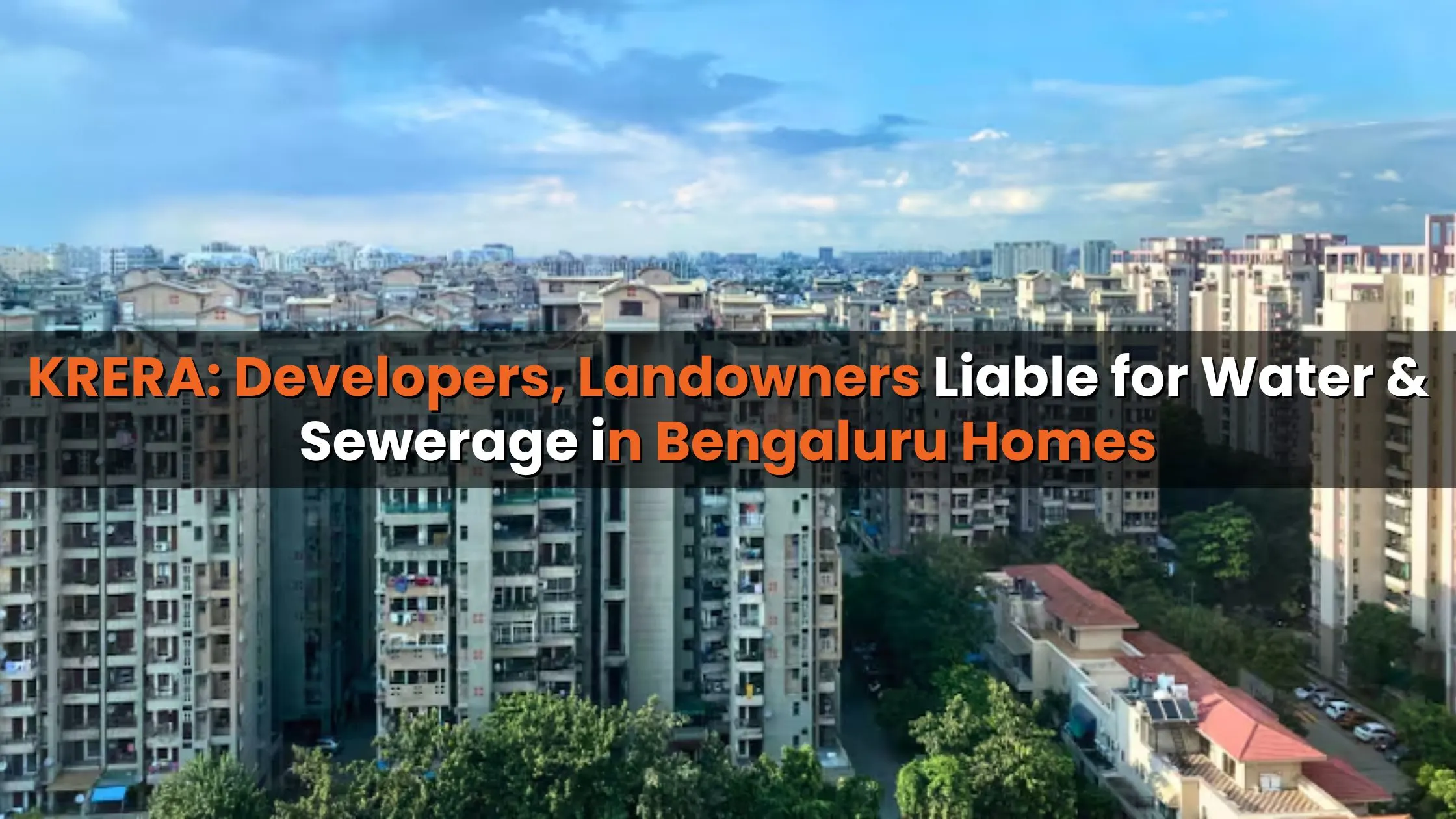Table of Content
▲
In a groundbreaking directive with far-reaching implications for joint development schemes, the Karnataka Real Estate Regulatory Authority (KRERA) has ruled that both property developers and landowners share equal responsibility for providing essential civic amenities, including water supply and sewerage connections, to homebuyers.
This decision addresses ongoing disputes in joint development projects, making it clear that accountability for basic infrastructure cannot rest solely on developers. Landowners, too, must fulfill obligations that directly affect residents’ quality of life.
The Case That Led to the Decision
The ruling follows a complaint filed by 30 homebuyers from the Adi’s North Lake housing project in Yelahanka, Bengaluru. Buyers alleged that despite paying the necessary charges, the developer failed to secure water and sewerage connections from the Bangalore Water Supply and Sewerage Board (BWSSB).
This delay in BWSSB certification has forced residents to depend on alternate water sources and also barred them from applying for Cauvery water under Phase 5 of the city’s supply network.
Also Read: Karnataka Government Notifies Revised Setback Rules for Buildings in Bengaluru
Equal Responsibility in Providing Infrastructure
KRERA clarified that in a Joint Development Agreement (JDA), the duty to ensure statutory compliance including BWSSB connections is proportionally shared between the developer and the landowner.
The authority’s order stated:
“The developer, landowner, and the residents’ association must, in coordination with BWSSB authorities, take all necessary measures to secure final water and sewerage connections for the project.”
In addition, both parties must hand over original project-related documents such as title deeds, approved plans, occupancy certificates, and statutory approvals to the registered Residents’ Welfare Association (RWA) without delay.
BWSSB Payment Dispute
The issue came to a head when BWSSB issued a demand notice of ₹91.36 lakh in June 2021. The challan expired after the payment deadline was missed.
The developer claimed to have already paid ₹30 lakh and committed to an additional ₹23 lakh within 15 days of the KRERA order. The landowner, however, allegedly failed to contribute his share of ₹38.37 lakh.
According to the developer, financial disagreements with the landowner and disruptions during the COVID-19 pandemic were the main reasons for the delay. A fresh challan request is now in progress.
KRERA’s Key Findings
The JDA for Adi’s North Lake, signed in 2013, allocated 58% of the built-up area to the developer and 42% to the landowner. Under Clause 28 of the agreement, both parties are proportionally liable for all statutory charges.
KRERA reinforced that under the RERA Act, developers and landowners are equally accountable for statutory compliance impacting essential service connections. The ruling ensures that a lapse by one party cannot deprive homebuyers of their fundamental rights.
Formal Handover to Residents
Residents also complained that the developer had not officially handed over the project to the RWA including transfer of legal paperwork, operational records, and governance over shared amenities.
Citing Section 11(4)(e) of the RERA Act, KRERA directed both parties to complete the handover immediately, calling it a critical step for transparency and community empowerment.
Also Read: SC Upholds Environment Ministry Notification, Junks Exemption Clause for Big Projects
Why This Ruling Is Important
This decision sets a strong precedent for future joint development projects not only in Bengaluru but across Karnataka. By holding both developers and landowners equally responsible, KRERA has strengthened homebuyer rights and increased accountability in the real estate sector.
Final Word
The KRERA ruling in Adi’s North Lake dispute sends a clear message in joint real estate ventures, responsibility is shared. Both developers and landowners must work hand in hand to meet their obligations and ensure residents receive the essential civic infrastructure they were promised.
For homebuyers, this judgment is more than a legal win it’s a step towards making their homes truly livable.
Follow AquireAcers Whatsapp Channel to Stay Updated With The Latest Real Estate News


_1771577585.webp)




Ans 1. KRERA ruled that in joint development projects, both developers and landowners are equally responsible for providing essential amenities like water supply and sewerage connections.
Ans 2. The dispute involved the Adi’s North Lake housing project in Yelahanka, Bengaluru.
Ans 3. They alleged that despite paying required charges, the developer failed to obtain BWSSB water and sewerage connections, forcing them to depend on alternate water sources.
Ans 4. BWSSB issued a demand notice of ₹91.36 lakh in June 2021, which expired after the payment deadline was missed.
Ans 5. Under the Joint Development Agreement, costs were shared based on their share of the built-up area—58% for the developer and 42% for the landowner.
Ans 6. The developer cited financial disputes with the landowner and disruptions during the COVID-19 pandemic.
Ans 7. KRERA ordered both parties to hand over original project documents, approvals, and legal records to the Residents’ Welfare Association (RWA) without delay.
Ans 8. It sets a precedent that in joint ventures, one party’s lapse cannot deny residents their basic infrastructure, strengthening homebuyer rights in Karnataka.
Ans 9. It mandates developers to hand over necessary documents and property management to the RWA after project completion.
Ans 10. It ensures greater accountability, transparency, and timely provision of essential civic services in joint development housing projects.